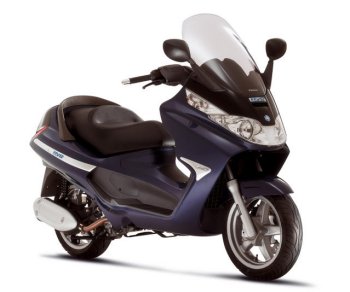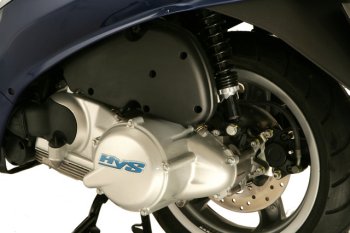|
Environmental
issues and the need for environment-friendly transport have
always been a priority for Piaggio. The company has launch
today an hybrid engine that will undoubtedly revolutionise
urban transport. Scooters has come to symbolise urban
mobility: they’re the ideal way to zip through congested
town traffic and fun to use on weekend trips. In recent
years, however, many towns have tackled the need to
reduce pollution
by creating an increasing number of restricted traffic
zones, where even scooters are banned entry. Manufacturers
have responded with zero-emissions electric vehicles for
unrestricted travel.
Thermal and electric
engines both have
advantages and disadvantages that are often
complementary. Combustion engines offer better range, power
and ‘lunge’, but give out
exhaust gas, although the current Euro 3 norm place
strict limits on these. Electric engines are zero-emission
and offer very quick pick-up from a stopped position, but
the batteries have
low range and
limited speed.
With the Piaggio HyS,
riders no longer have to choose between performance and
environment friendliness or between a vehicle to commute in
town and one for longer trips.
HyS is a
revolutionary hybrid
scooter prototype, a marked
evolution as regards urban
transport that combines the advantages of gasoline and
electric engines. The Piaggio HyS does not merely
put two engine types on a
single vehicle. The two engines are part of a
sophisticated system that
combines combustion engine power and electric motor pick-up.
This hybrid scooter can go into restricted traffic zones and
travel out of town. It’s
two scooters in one — practical, easy, fun
all-round transport.
Two engines in one
Piaggio HyS
is a “parallel” hybrid in which a combustion engine and an
electric motor are mechanically and electronically linked
and simultaneously supply power to the wheel.
In this linked gas/electric
engine, the gasoline engine behaves like a normal
catalysed four-stroke engine with excellent performance and
distance range on the one hand and low emissions and fuel
consumption on the other.
The automatic gearbox,
electric ignition and automatic start provide the
usual zip and ease of use in town as well as out-of-town
trips. The gas engine
offers sparkling performance in standard running,
charging the electric motor
all the while.
And, whenever the rider needs to accelerate particularly
fast — when starting from a stopped position, for example —
the electric motor assists
the engine, supplying about 85% extra performances
that gives the vehicle snappier, more efficient acceleration
over the first few metres, when it is really needed in town
riding. In-built electronic
management combines the two engines to offer not
only better acceleration but also about
a reduction in fuel
consumption (up to
60 km/l) and in CO2 emissions, only 40 g/km (using
65% the hybrid modes and 35% the electric one).
The Piaggio HyS is
not your average hybrid engine.
|
 |
|
Piaggio HyS is a
“parallel” hybrid in which a combustion engine and
an electric motor are mechanically and
electronically linked and simultaneously supply
power to the wheel. |
|
 |
|
|

 |
|
All this technology is neatly tucked away.
The three Piaggio HyS versions
look like any standard Vespa LX, Piaggio X8 (above)
or MP3. |
|
|
Other scooters may stop, but the HyS keeps going, quick and
silent, because it can also
work in electric-only mode with
a range up to 20 km.
The rider simply turns a handlebar switch
to shut down the combustion
engine and turn the Piaggio HyS into a
totally
environment-friendly scooter, a zero-emissions vehicle
that can go into any area closed to other types of traffic.
Another turn of the switch and the thermal engine turns
itself on and goes back to being the main engine, charging
the battery as it travels through areas open to normal
traffic. The scooter’s range can be optimised in the garage
by charging the battery from an electricity source using the
220V battery charger.
This reduces running costs,
electricity being cheaper than gasoline.
Technology at the turn of a switch
The
Piaggio HyS uses
very innovative, avant-garde technical solutions but remains
incredibly easy and
intuitive to use. The rider uses all the
normal controls
(accelerator, brakes and additional handlebar commands) as
well as a specific switch
to choose one of the different operating modes:
three hybrid, one electric-only and the reverse.
In the first three modes the HyS manages power output from
the two engines, thermal and electric, using
a drive-by-wire type system:
the electronic management
system (SGE) interprets the rider’s request for
more torque and selects the
assist ratio based on the state of the system (e.g.
the level of battery charge).
During deceleration
and braking, the control
system recovers and accumulates power that is lost on normal
vehicles in the battery.
The three hybrid modes are conceived to optimize
performances, consumption and battery charge. In
electric-only mode,
the Piaggio HyS shuts down the combustion engine and turns
into a silent,
zero-emission electric vehicle. Drive-by-wire
technology not only allows the control system to optimally
manage the combined power
output of the two engines but also ‘forces’ the
thermal engine to work when it can be most efficient,
thereby reducing specific consumption, with obvious
advantages in terms of lower consumption and emissions.
All this
technology is neatly tucked away.
The three Piaggio HyS
versions look like any standard Vespa LX, Piaggio
X8 or MP3. On X8 and MP3 versions the
traction batteries
are hidden in the
under-seat storage space, which is sufficiently
large to also hold a helmet.
The Vespa LX hybrid prototype comes with a
top case to hold
the helmet. There is a
battery charge indicator on the
dashboard. The
battery can be recharged
from an electricity source by inserting a normal
cable into the plug provided for this purpose.
Charging time is
about three hours.
|
|
|
|